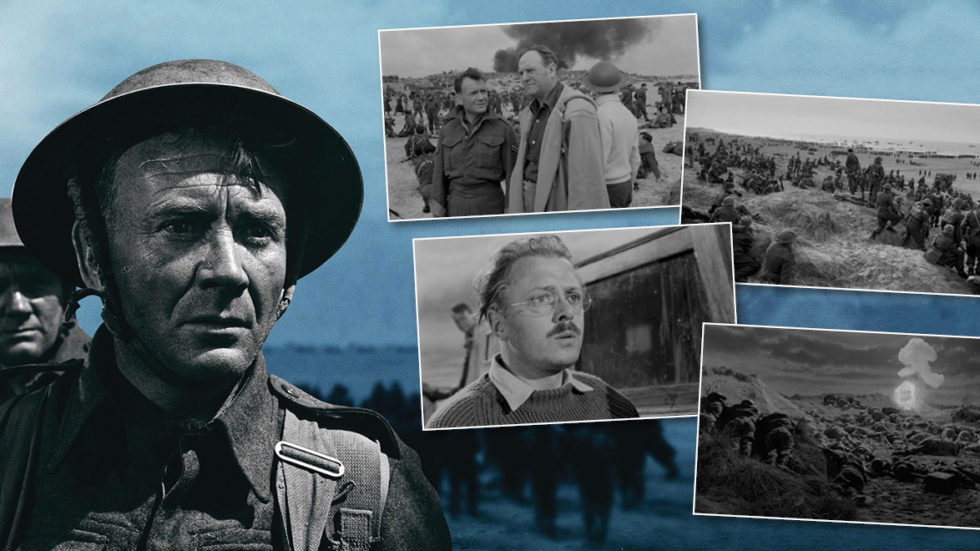The Golden Era Of British Cinema Comes To Sussex! Dunkirk (1958): Screening On The Beach

This September, commemorate the enduring British artime spirit of heroism amid severely chaotic conditions as STUDIOCANAL brings a very special late summer event to Sussex, a restored showing of Leslie Norman’s 1958 epic Dunkirk as allied forces evacuated France in the face of great adversity.
The special event on the beaches of Camber Sands on Wednesday, September 20 and Thursday, September 21 will be the premiere screening of a new restoration of the 1950s classic starring John Mills, who also appeared in Ice Cold In Alex, Goodbye Mr Chips, and Great Expectations, Richard Attenborough star of Brighton Rock, and The Great Escape, and a cast of genuine army officers.
Directed by Leslie Norman, whose other work includes The Long, The Short And The Tall, Dunkirk is acclaimed as one of the most authentic representations of conflict, and was filmed on the exact beaches of Camber Sands that the screening will take place. The event is in association with The Luna Cinema and The Vintage Festival, and is part of the BFI’s Britain On Film Collection: Coast and Sea
As well as the screening, event-goers will enjoy an evening of themed 1940s entertainment including food and drink of the era, 1940s dance classes and set dressing, music and re-enactments. Gates open at 5.30pm, and the screening begins at 7.30pm. The screening will be preceded by archive films, including a montage of footage from the local coastal area at the time of the production.
[one_half]Dunkirk follows the events leading up to Operation Dynamo, where the British Army attempted to rescue fellow soldiers and allied troops from Nazi occupied France. Seen from the dual perspectives of a jaded journalist in search of propaganda and a weary soldier desperately trying to give his troop some hope, Dunkirk never shies away from the brutality of war and the bravery of its soldiers.
The new restoration of Dunkirk is released on DVD, Blu-ray and EST, with new extras on Monday, September 25 2017 from STUDIOCANAL as part of their Vintage Classics Collection – showcasing iconic British films, fully restored and featuring new content. For more information and to book tickets to the Camber Sands event visit: www.scnl.co/DunkirkPremiere
[/one_half][one_half_last] [box type=”shadow” align=”” class=”” width=””]Hard and Heavy Tidings
Before the Dunkirk evacuation operation was completed, the prognosis had been very gloomy, Prime Minister Winston Churchill warned the House of Commons on May 28 to expect “hard and heavy tidings”.
Subsequently, Churchill referred to the outcome as a miracle, and the British press presented the evacuation as a disaster turned to triumph so successfully Churchill had to remind the country, “we must be very careful not to assign to this deliverance the attributes of a victory. Wars are not won by evacuations.” [/box] [/one_half_last]
The Fallen
The British Expeditionary Force (BEF) lost 68,000 soldiers (dead, wounded, missing, or captured) from May 10 until the surrender of France on June 22. Heavy equipment had to be abandoned, leaving behind in France 2,472 guns, 20,000 motorcycles, and almost 65,000 other vehicles.
Six British and three French destroyers were sunk, along with nine other major vessels. In addition, 19 destroyers were damaged. More than 200 British and allied sea craft were sunk, with a similar number damaged. The Royal Navy’s most significant losses in the operation were six destroyers
The RAF lost 145 aircraft, of which at least 42 were Spitfires, while the Luftwaffe lost 156 aircraft in operations in the nine days of Operation Dynamo. The Royal Navy claimed the destruction of 35 Luftwaffe aircraft during the period from May 27 to June 1 and damage to 21 other aircraft.
For every seven soldiers who escaped through Dunkirk, one was left behind as a prisoner of war. The majority of these prisoners were sent on forced marches into Germany. Prisoners reported brutal treatment by their guards, including beatings, starvation, and murder.
Many of the prisoners were marched to the city of Trier, with the march taking as long as 20 days. The prisoners were then sent by rail to prisoner of war camps in Germany. The majority (those below the rank of corporal) worked in industry and agriculture for the remainder of the war.
Today, the missing dead of the BEF are commemorated on the Dunkirk Memorial.
 For more information and to book tickets, visit: www.scnl.co/DunkirkPremiere or for the latest news and for other coverage visit The Luna Cinema Facebook page: www.facebook.com/TheLunaCinema/
For more information and to book tickets, visit: www.scnl.co/DunkirkPremiere or for the latest news and for other coverage visit The Luna Cinema Facebook page: www.facebook.com/TheLunaCinema/






